日本地震(英语)
- 格式:ppt
- 大小:1.57 MB
- 文档页数:8
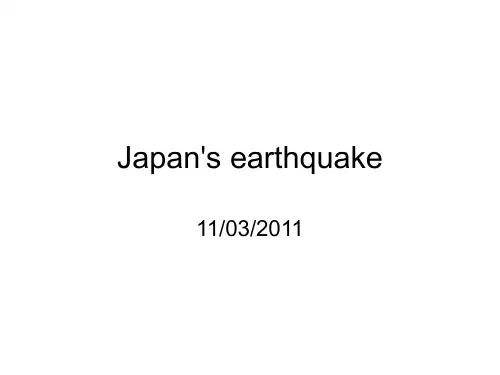
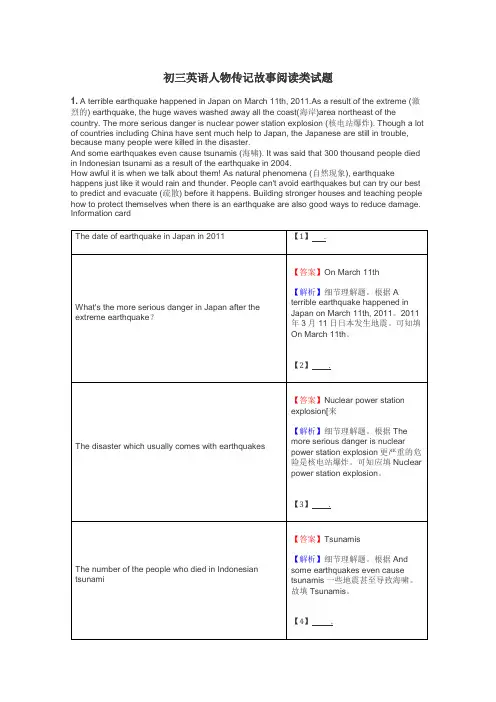
初三英语人物传记故事阅读类试题1. A terrible earthquake happened in Japan on March 11th, 2011.As a result of the extreme (激烈的) earthquake, the huge waves washed away all the coast(海岸)area northeast of the country. The more serious danger is nuclear power station explosion (核电站爆炸). Though a lot of countries including China have sent much help to Japan, the Japanese are still in trouble, because many people were killed in the disaster.And some earthquakes even cause tsunamis (海啸). It was said that 300 thousand people died in Indonesian tsunami as a result of the earthquake in 2004.How awful it is when we talk about them! As natural phenomena (自然现象), earthquake happens just like it would rain and thunder. People can't avoid earthquakes but can try our best to predict and evacuate (疏散) before it happens. Building stronger houses and teaching people how to protect themselves when there is an earthquake are also good ways to reduce damage. Information card【答案】Building stronger houses【解析】归纳理解题。

All of those broken bones in northern Japan, all of those broken lives and those broken homes prompt us to remember what in calmer times we are invariably minded to forget: the most stern and chilling of mantras, which holds, quite simply, that mankind inhabits this earth subject to geological consent—which can be withdrawn at any time.For hundreds, maybe for thousands of people, this consent was withdrawn with shocking suddenness—all geological events are sudden, and all are unexpected if not necessarily entirely unanticipated—at 2:46 on this past clear, cool spring Friday afternoon. One moment all were going about their quotidian business—in offices, on trains, in rice fields, in stores, in schools, in warehouses, in shrines—and then the ground began to shake. At first, the shock was merely a much stronger and longer version of the temblors to which most Japanese are well accustomed. There came a stunned silence, as there always does. But then, the difference: a few minutes later a low rumble from the east, and in a horrifying replay of the Indian Ocean tragedy of just some six years before, the imagery of which is still hauntingly in all the world’s mind, the coastal waters off the northern Honshu vanished, sucked mysteriously out to sea.The rumbling continued, people then began to spy a ragged white line on the horizon, and, with unimaginable ferocity, the line became visible as a wall of waves sweeping back inshore at immense speed and at great height. Just seconds later and these Pacific Ocean waters hit the Japanese seawalls, surmounted them with careless ease, and began to claw across the land beyond in what would become a dispassionate and detached orgy of utter destruction.We all now know, and have for 50 years, that geography is the ultimate reason behind the disaster. Japan is at the junction of a web of tectonic-plate boundaries that make it more peculiarly vulnerable to ground-shaking episodes than almost anywhere else—and it is a measure of Japanese engineering ingenuity, of social cohesion, of the ready acceptance of authority and the imposition of necessary discipline that allows so many to survive these all-too-frequent displays of tectonic power.But geography is not the only factor in this particular and acutely dreadful event. Topography played an especially tragic role in the story, too—for it is an axiom known to all those who dwell by high-tsunami-risk coastlines that when the sea sucks back, you run: you run inland and, if at all possible, you run uphill. But in this corner of northeast Japan, with its wide plains of rice meadows and ideal factory sites and conveniently flat airport locations, there may well be a great deal of inland—but there is almost no uphill.Such mountains as exist are far away, blue and distant in the west. All here is coastal plain. And so the reality is this: if a monstrous wave is chasing you inland at the speed of a jetliner, and if the flat topography all around denies you any chance of sprinting to a hilltop to try to escape its wrath, then you can make no mistake—it will catch you, it will drown you, and its forces will pulverize you out of all recognition as a thing of utter insignificance, which of course, to a tsunami, all men and women and their creations necessarily must be.所有这些骨折在日本北部,所有这些破碎的生活和那些破碎的家庭促使我们希望记住在平静的时候我们总是有意忘记:最严厉和令人心寒的咒语,并将拥有非常简单,这是人类栖居在这个地球上受地质consent-which随时可能被取消。
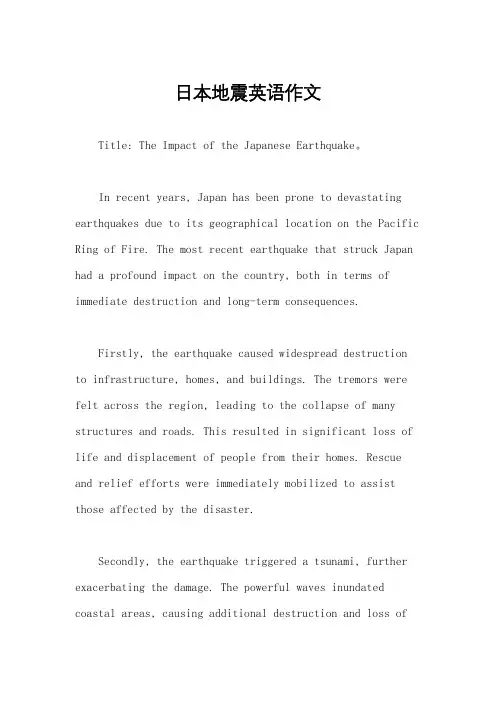
日本地震英语作文Title: The Impact of the Japanese Earthquake。
In recent years, Japan has been prone to devastating earthquakes due to its geographical location on the Pacific Ring of Fire. The most recent earthquake that struck Japan had a profound impact on the country, both in terms of immediate destruction and long-term consequences.Firstly, the earthquake caused widespread destruction to infrastructure, homes, and buildings. The tremors were felt across the region, leading to the collapse of many structures and roads. This resulted in significant loss of life and displacement of people from their homes. Rescue and relief efforts were immediately mobilized to assist those affected by the disaster.Secondly, the earthquake triggered a tsunami, further exacerbating the damage. The powerful waves inundated coastal areas, causing additional destruction and loss oflife. The tsunami also disrupted transportation networks and economic activities in the affected regions.The environmental impact of the earthquake was also substantial. The release of pollutants and hazardous materials from damaged industrial facilities posed serious risks to public health and the ecosystem. Cleanup efforts were launched to mitigate the environmental damage and prevent further contamination.In addition to the immediate consequences, the earthquake had long-term effects on Japan's economy and society. The disruption to businesses and supply chains led to economic losses, affecting both domestic and international trade. Reconstruction efforts required significant investment of resources and time, straining the country's finances.Furthermore, the psychological impact of the earthquake cannot be overlooked. Many survivors experienced trauma and emotional distress as a result of the disaster. The loss of loved ones, homes, and livelihoods left a lasting impact onindividuals and communities, requiring mental healthsupport and counseling services.Despite the challenges posed by the earthquake, Japan demonstrated resilience and solidarity in the face of adversity. The government, along with local authorities and international partners, worked together to provide aid and support to those in need. Communities came together to rebuild and recover, emphasizing the importance of preparedness and disaster resilience.In conclusion, the Japanese earthquake had far-reaching consequences, affecting various aspects of life in the country. From infrastructure damage to economic disruption and psychological trauma, the impact of the disaster was profound. However, through concerted efforts and resilience, Japan was able to overcome the challenges and embark on the path to recovery.。
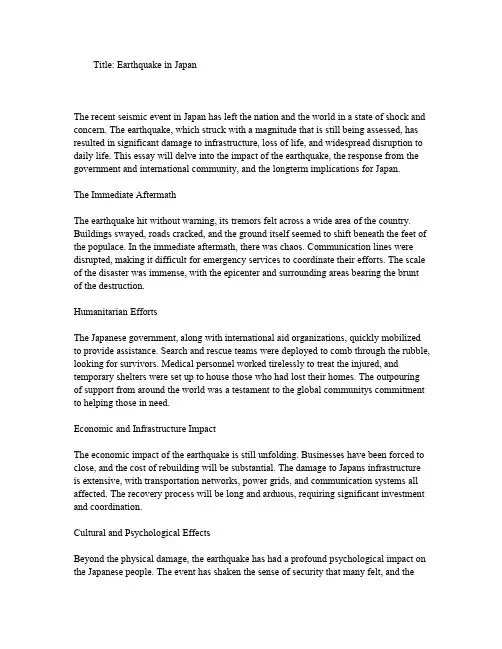
Title:Earthquake in JapanThe recent seismic event in Japan has left the nation and the world in a state of shock and concern.The earthquake,which struck with a magnitude that is still being assessed,has resulted in significant damage to infrastructure,loss of life,and widespread disruption to daily life.This essay will delve into the impact of the earthquake,the response from the government and international community,and the longterm implications for Japan.The Immediate AftermathThe earthquake hit without warning,its tremors felt across a wide area of the country. Buildings swayed,roads cracked,and the ground itself seemed to shift beneath the feet of the populace.In the immediate aftermath,there was munication lines were disrupted,making it difficult for emergency services to coordinate their efforts.The scale of the disaster was immense,with the epicenter and surrounding areas bearing the brunt of the destruction.Humanitarian EffortsThe Japanese government,along with international aid organizations,quickly mobilized to provide assistance.Search and rescue teams were deployed to comb through the rubble, looking for survivors.Medical personnel worked tirelessly to treat the injured,and temporary shelters were set up to house those who had lost their homes.The outpouring of support from around the world was a testament to the global communitys commitment to helping those in need.Economic and Infrastructure ImpactThe economic impact of the earthquake is still unfolding.Businesses have been forced to close,and the cost of rebuilding will be substantial.The damage to Japans infrastructure is extensive,with transportation networks,power grids,and communication systems all affected.The recovery process will be long and arduous,requiring significant investment and coordination.Cultural and Psychological EffectsBeyond the physical damage,the earthquake has had a profound psychological impact on the Japanese people.The event has shaken the sense of security that many felt,and thefear of aftershocks and potential tsunamis has left a lasting impression.The cultural fabric of the country has also been affected,with many historic sites and landmarks damaged or destroyed.Looking AheadAs Japan begins the process of recovery,it is clear that the path forward will be challenging.The nation will need to balance the immediate needs of its people with the longterm goals of rebuilding and modernizing its infrastructure.The international community will also need to continue to provide support,both in terms of financial aid and technical expertise.In conclusion,the earthquake in Japan is a stark reminder of the power of nature and the fragility of human life.It has brought about a period of great hardship,but also one of unity and resilience.The world will be watching as Japan rises from the rubble,and the lessons learned from this disaster will undoubtedly shape the nations future.。
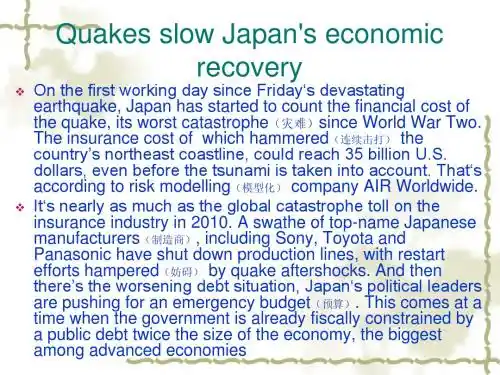
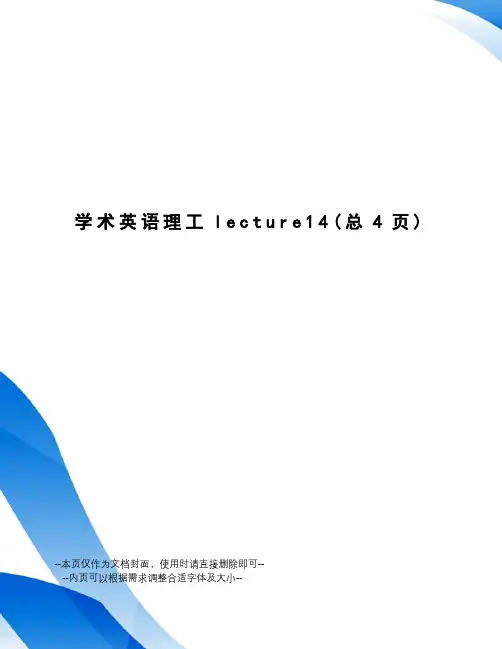
学术英语理工l e c t u r e14(总4页)--本页仅作为文档封面,使用时请直接删除即可----内页可以根据需求调整合适字体及大小--On March 11, 2011, a magnitude earthquake struck Japan, causing a devastating tsunami that tore through the coastal regions and leveled the villages in its path. The earthquake also severely damaged nuclear reactors at the Fukushima Daiichi Power Plant, sparking explosions and the releaseof radioactive material.Recent reports suggest that leaks from thereactor's core may be extremely dangerous, not only threatening workersthere but also contaminating the facility and surrounding community on the longer term.As Japanese engineers, scientists, and firefighters work to control the continuing crisis at the vulnerable Fukushima plant -- efforts that are hindered by strong aftershock earthquakes -- fears about the scope of this nuclear disaster and the radiation's health effects continue to spread.Radiation is energy that is transmitted in the form of waves or particles. Ionizing radiation describes waves or particles that have enough energy to remove electrons from other atoms, thus creating chemically reactive ions (charged atoms) that can damage 年3月11日,日本发生级地震,造成毁灭性的海啸,横扫了沿海地区,摧毁了村庄的道路。
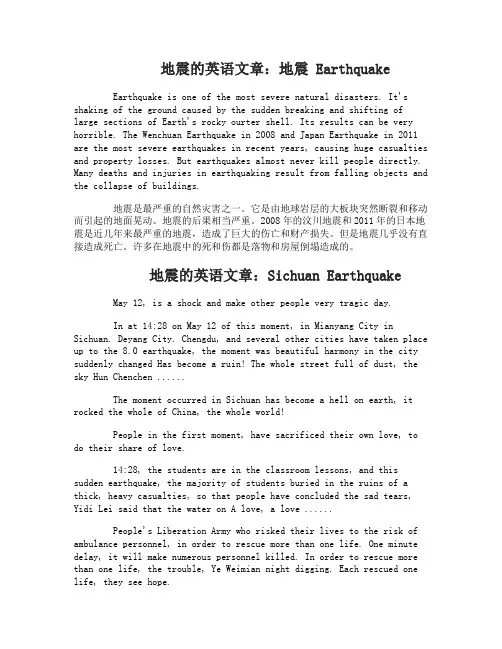
地震的英语文章:地震 EarthquakeEarthquake is one of the most severe natural disasters. It's shaking of the ground caused by the sudden breaking and shifting of large sections of Earth's rocky ourter shell. Its results can be very horrible. The Wenchuan Earthquake in 2008 and Japan Earthquake in 2011 are the most severe earthquakes in recent years, causing huge casualties and property losses. But earthquakes almost never kill people directly. Many deaths and injuries in earthquaking result from falling objects and the collapse of buildings.地震是最严重的自然灾害之一。
它是由地球岩层的大板块突然断裂和移动而引起的地面晃动。
地震的后果相当严重。
2008年的汶川地震和2011年的日本地震是近几年来最严重的地震,造成了巨大的伤亡和财产损失。
但是地震几乎没有直接造成死亡。
许多在地震中的死和伤都是落物和房屋倒塌造成的。
地震的英语文章:Sichuan Earthquake May 12, is a shock and make other people very tragic day.In at 14:28 on May 12 of this moment, in Mianyang City in Sichuan. Deyang City. Chengdu, and several other cities have taken place up to the 8.0 earthquake, the moment was beautiful harmony in the city suddenly changed Has become a ruin! The whole street full of dust, the sky Hun Chenchen ......The moment occurred in Sichuan has become a hell on earth, it rocked the whole of China, the whole world!People in the first moment, have sacrificed their own love, to do their share of love.14:28, the students are in the classroom lessons, and this sudden earthquake, the majority of students buried in the ruins of a thick, heavy casualties, so that people have concluded the sad tears, Yidi Lei said that the water on A love, a love ......People's Liberation Army who risked their lives to the risk of ambulance personnel, in order to rescue more than one life. One minute delay, it will make numerous personnel killed. In order to rescue more than one life, the trouble, Ye Weimian night digging. Each rescued one life, they see hope.Premier Wen Jiabao chaired a State Council meeting earthquake relief headquarters immediately after the car came to the DujiangyanCity streets to see the rain shock absorber of the masses.Premier Wen Jiabao also made a special trip to the new primary schools, visit the rescue of earthquake was buried in the ruins of the situation in the primary and secondary school students. He braved danger, follow mud, climbing on the rubble pile, into the rescue site, watching the scene, the two lines can not help but shed tears. He went to the remains of three people killed bow.During the earthquake occurred countless times over five aftershocks. In the rising number of deaths, was rescued also rising, according to statistics, Sichuan earthquake death toll more than54,000 ......Ten China, the world moved in the earthquake, many adultchildren to pay in order to save their lives.People will always remember them!Surmount earthquake relief.The more the more difficult to hold on, hold on, Sichuan!四川大地震5月12日,是一个另人震惊而又使人无比悲痛的日子。
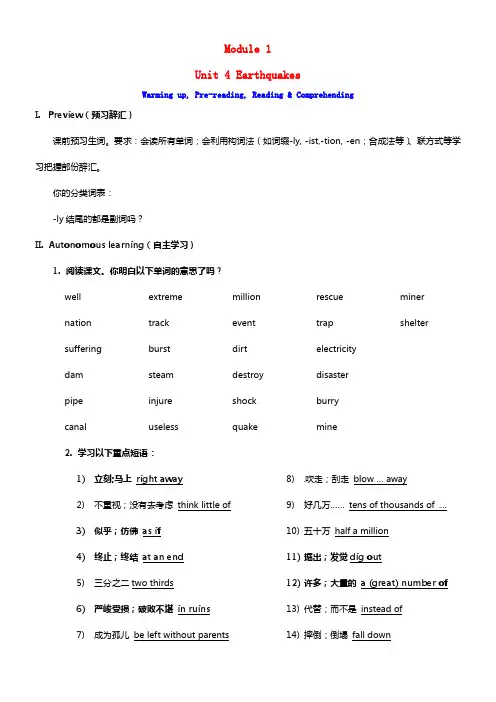
Module 1Unit 4 EarthquakesWarming up, Pre-reading, Reading & ComprehendingI.Preview(预习辞汇)课前预习生词。
要求:会读所有单词;会利用构词法(如词缀-ly, -ist,-tion, -en;合成法等)、联方式等学习把握部份辞汇。
你的分类词表:-ly结尾的都是副词吗?II.Autonomous learning(自主学习)1.阅读课文。
你明白以下单词的意思了吗?well nation suffering dam pipe canal extremetrackburststeaminjureuselessmillioneventdirtdestroyshockquakerescuetrapelectricitydisasterburrymineminershelter2.学习以下重点短语:1)立刻;马上right away2)不重视;没有去考虑think little of3)似乎;仿佛as if4)终止;终结at an end5)三分之二two thirds6)严峻受损;破败不堪in ruins7)成为孤儿be left without parents 8)吹走;刮走blow … away9)好几万……tens of thousands of …10)五十万half a million11)掘出;发觉dig out12)许多;大量的a (great) number of13)代替;而不是instead of14)摔倒;倒塌fall down15)陷入be trapped in16)在乡下;在农村in the countryside3.Pre-readingLook at the pictures on Page 25 and imagine what will happen before an earthquake.Picture 1 Bright light flashes in the sky.Picture 2 Chickens are flying, dogs are barking, pigs and cows are too nervous to eat.Picture 3 Mice run out of the fields looking for places to hide. Fish jump out of their bowls and ponds.Picture 4 The well has deep cracks in it, and the water in it rises and falls.4.Reading1)What do you think the title “A night the earth didn’t sleep” means?“A night the earth didn’t sleep”is a poetic way of saying that an earthquake happened.”2)Write down the main idea of each part.Paragraph 1: Before the earthquake strange things began to happen but no one thought little of (paid attention to/took no notice of) them.Paragraph 2: The earthquake destroyed the city of T angshan and shocked the people very much.Paragraph 3: The people were very shocked at the destruction. (or: What the city looked like after the earthquake.)Paragraph 4: Rescue work. The army came to help the survivors, bringing hope for a new life.3)Read the pa ssage carefully and join the correct parts of the sentences. (Ex. 1, Page 27)1. The chickens didn’t eat because2. The people didn’t worry because3. Such a great number of people diedbecause4. Water was needed because5. The people did not lose hope becauseA. the army came to help them.B. the quake happened while they weresleeping.C. they were nervous.D. dams and wells were useless.E. they didn’t know what the strangeevents meant.4)Read the passage again and make a timeline.TIME EVENTSFor three days 1. water in the village wells rose and fell2. well walls developed deep cracks3. a smelly gas came out of the cracks4. mice ran out of the fields5. fish jumped out of their bowls and pondsAbout 3:00 am on July 28, 19761. bright lights appeared in the sky2. the sound of planes could be heard although there were no planes3. some water pipes burstAt 3:42 am on July 28, 1976 1. everything began to shake2. huge cracks appeared in the roads3. steam burst from holes in the ground4. rock turned into rivers of dirt5. 75% buildings and 90% o homes were gone6. more than 400,000 people killed or injured7. two dams fell and most of the bridges also fell or notsafe8. the railway tracks were uselessAfternoon of July 28, 1976 1. a second quake almost as strong as the first one2. more damages to buildings and rescuersSoon after the quake 1. the army arrived2. shelters built for survivors3. water supplies brought in5)Consolidation: Retell the text by filling in the missing wordsStrange things happened in Tangshan. For a few days before the earthquake, water in the wells rose and fell. From the cracks of wells a smelly gas came out. Mice, chickens, pigs and even fish became nervous. At 3:42 am, everything began to shake. It seemed as if the world was at an end. One third of the nation felt it. A huge crack cut across the city. The city lay in ruins. Two-thirds of the people died or were injured. Then, later that afternoon, another big quake shook T angshan. People began to wonder how long the disaster would last. But all hope was not lost. Soldiers came to help those survivors. Slowly, the city began to breathe.5.Sentence patterns(重点句型)1)What do you think will happen before an earthquake?该句型是:“疑问词+ do you think/suppose/guess/believe + 陈述语序”对照以下两个句子:Do you know where he lives?Where do you think he lives?你以为谁拿走了我的雨伞?Who do you think has taken my umbrella?你想咱们应该何时制定打算?When do you think we should make our plan?2)In the farmyards, the chickens and even the pigs were too nervous to eat.翻译:农家大院了的鸡,乃至猪都紧张得不想吃食。
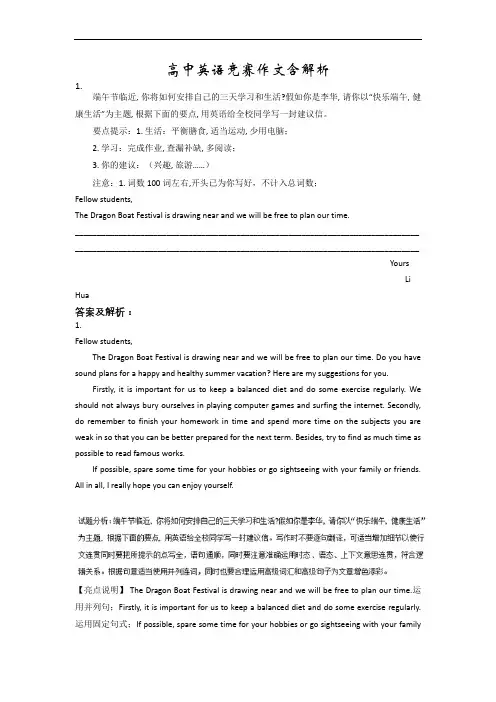
高中英语竞赛作文含解析1.端午节临近, 你将如何安排自己的三天学习和生活?假如你是李华, 请你以“快乐端午, 健康生活”为主题, 根据下面的要点, 用英语给全校同学写一封建议信。
要点提示:1. 生活:平衡膳食, 适当运动, 少用电脑;2. 学习:完成作业, 查漏补缺, 多阅读;3. 你的建议:(兴趣, 旅游……)注意:1. 词数100词左右,开头已为你写好,不计入总词数;Fellow students,The Dragon Boat Festival is drawing near and we will be free to plan our time._______________________________________________________________________________ _______________________________________________________________________________YoursLi Hua答案及解析:1.Fellow students,The Dragon Boat Festival is drawing near and we will be free to plan our time. Do you have sound plans for a happy and healthy summer vacation? Here are my suggestions for you.Firstly, it is important for us to keep a balanced diet and do some exercise regularly. We should not always bury ourselves in playing computer games and surfing the internet. Secondly, do remember to finish your homework in time and spend more time on the subjects you are weak in so that you can be better prepared for the next term. Besides, try to find as much time as possible to read famous works.If possible, spare some time for your hobbies or go sightseeing with your family or friends. All in all, I really hope you can enjoy yourself.【亮点说明】 The Dragon Boat Festival is drawing near and we will be free to plan our time.运用并列句;Firstly, it is important for us to keep a balanced diet and do some exercise regularly.运用固定句式;If possible, spare some time for your hobbies or go sightseeing with your familyor friends.运用if条件句;Secondly, do remember to finishyour homework in time and spend more time on the subjects you are weak in so that you can be better prepared for the next term. 此句式为文章增色,显得文章很有档次。
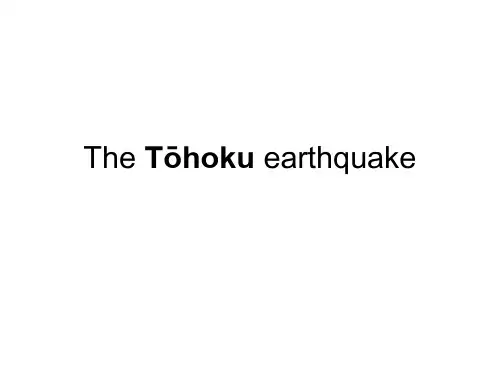
[作文]关于地震的英语作文15篇关于地震的英语作文关于地震的英语作文(一):中文:地震是最严重的自然灾害之一。
它是由地球岩层的大板块突然断裂和移动而引起的地面晃动。
地震的后果相当严重。
2008年的汶川地震和2011年的日本地震是近几年来最严重的地震,造成了巨大的伤亡和财产损失。
但是地震几乎没有直接造成死亡。
许多在地震中的死和伤都是落物和房屋倒塌造成的。
英文:Earthquakeisoneofthemostseverenaturaldisasters。
It’sshak ingofthegroundcausedbythesuddenbreakinga ndshiftingoflargesectionsofEarth’srockyourtershe ll。
Itsresultscanbeveryhorrible。
ThewenchuanEarthquakein2008andjapanEarthquakein20 11arethemostsevereearthquakesinrecentyears,causinghugecasualtiesandpropertylosses。
Butearthquakesalmostneverkillpeopledirectly。
manydeathsandinjuriesinearthquakingresultfromfall ingobjectsandthecollapseofbuildings。
关于地震的英语作文(二):Anearthquakeisashakingofthegroundcausedbythesudde nbreakingandshiftingoflargesectionsofEarth’srock youtershell。
Earthquakesareamongthemostpowerfuleventsonearth,andtheirresultscanbeterrifying。
The earthquake in JapanE: hello, Sally. Nice to meet you! How are you?S: Just so so. Whatabout you?E:I’m fine, thank you. It happened many disasters in recently years. Are you concerned about it?S:Yes, of course. There is a catastrophe which happened in Japan. How it is a9.0-magnitude earthq uake! What’s more, it caused a tsunami, which resulting10-meter-high and devastating the coastline. That’s so terrible! It was felt as far away as South Korea.(远至韩国都有震感)E:That’s true. At that time, after shocks continued to hit north eastern Japan. There is concern that further aftershocks could also trigger landslides.(而且他们担心再发生余震的话,可能会导致滑坡。
)There is obviously just hundreds, if not thousands, of the setypes of towns and villages that have been to tally or partly destroyed. The final death toll could range from the thousands to tens of thousands. Someone said that it would cause the threat of a nuclear meltdown?S: Sure. Experts are saying the devastating combination of earthquake, tsunami and now - the deepening nuclear crisis, (专家们说,地震、海啸,以及目前不断加深的核危机形成了毁灭性的灾难组合。
地震选取英语一、单词1. earthquake- 英语释义:A sudden and violent shaking of the ground, sometimes causing great destruction, as a result of movements within the earth's crust or volcanic action.(由于地壳运动或火山活动等原因,地面突然且剧烈的震动,有时会造成巨大破坏。
)- 用法:常作可数名词,可用于描述各种规模的地震情况。
例如:The earthquake last night was very strong.(昨晚的地震很强烈。
)- 双语例句:Many buildings were damaged in the earthquake.(许多建筑物在地震中遭到了损坏。
)2. quake- 英语释义:(intransitive verb) to shake or tremble, especially because of fear or shock; (noun) a shaking movement.(动词,尤指因恐惧、震惊而颤抖;名词表示摇动、震动的动作,也可用于指地震,比较口语化。
)- 用法:作动词时,常用搭配如“quake with fear(吓得发抖)”;作名词时,可替换“earthquake”使用在较随意语境,如:There was a big quake yesterday.(昨天发生了一场大地震。
)- 双语例句:The ground began to quake and people ran out of theirhouses in panic.(地面开始震动,人们惊慌地跑出屋子。
)3. tremor- 英语释义:A slight earthquake; a shaking or vibrating movement, often continuous and hardly noticeable but sometimes growing stronger.(轻微的地震;一种震动或颤动的动作,通常是持续的、不太明显,但有时会变强。
关于地震的英语阅读理解【题目】阅读理解。
根据短文内容,判断下列句子的正误。
When we feel the ground moves suddenly, it means that an earthquake may come. Many of the earthquakes first come under the sea and then happen anywhere on the earth. Especially they often happen near the mountains and seas such as Wenchuan, Japan and Indonesia.When an earthquake happens, it's very easy to cause a tsunami (海啸). Houses fall down, many people are injured and even died.Now scientists are trying their best to study earthquakes. They make maps to show t he “earthquake belts (地震带)”. So the houses there must be quite strong.We believe that scientists will be able to tell us when and where an earthquake will happen in the near future. Also, they can tell us what to do and how to do. People can even use earthquakes to do something for us humans.(1)Earthquakes often happen in Japan.(2)Sometimes an earthquake happens with a tsunami.(3)Many people lost their lives in the earthquakes because they didn't help each other.(4)In areas in the “earthquake belts”, people build strong houses. (5)Scientists can prevent earthquakes happening.【答案】(1)right(2)right(3)wrong(4)right(5)wrong【解析】短文介绍了地震方面的常识。
要求如下:一场恐怖的地震发生在日本,所产生的高达十米海啸(enormous of ten meter higth)冲掉(wash away)了日本所有的东北沿海地区(coast area N.E part ofcountry),不过最糟糕的(what’s worse )是核泄漏(nuclear power station explosion)。
但是各个国家已派出很多救援队(many rescue)帮助日本,只是日本人民仍处于痛苦(misery)中,因为在地震中有很多逝去的生命。
要求100字左右1.A terrorist earthquake in Japan, generated by as much as 10 meters of the enormous tsunamis (operations higth) rushs (wash away) Japan all the northeast coast area N.E coastal regions (ofcountry), but again the worst (worse) is sorry 's nuclear power now nuclear leak (explosion). But each country has sent many rescue teams (rescue) helped Japan, many people still is a Japanese on pain of misery), because (in earthquake has lots of lost life2.Yesterday, in Japan 8.8 magnitude occurred maizuru, powerful earthquake, the earthquake let us, this earthquake looming is terrific, the entire honshu island ulterly changed, earthquake that triggered the big fire entire towns, and because the main honshu island is the coastal regions, so because the quake triggered a tsunami, the tsunami have been rushed to the imperial county, and it took the whole Japan's floor is main honshu island say all the boundless, became engulfed by the sea, today, because tsunami caused a whirlpool, then, take everything contributed in. Can say is really powerful.In the earthquake, many people have lost family and friends, some people even themselves are dead, they how poor! Natural disasters are ruthless, according to expert introduction, the Japanese earthquake destructive more than 20 wenchuan earthquake damage. The earthquake has the highest an earthquake, series is really powerful! They know how pain, lose his family is a thing, as we live in the same earth, should also help them.The earthquake actually is also a warning, it reminds us, to protect the environment, not to do a great deal of extraction, this can lead to underground energy strong earthquake if coastal areas, also take care not to put the rubbish into the sea, that will also pollute the environment.Let us environmental protection! Let our earth more beautiful, more beautiful! 意思:昨天,在日本本州岛发生了8.8级的强烈大地震,这次的地震让我们触目惊心,这次的地震是非常厉害的,整个本州岛面目全非,地震引发的大火烧了整个城镇,并且由于本州岛是沿海地区,所以因为地震还引发了海啸,这次的海啸一直冲到宫廷县德楼,把整个日本本州岛可以说是全部吞没,变成了茫茫的海洋,今天,由于海啸发生,于是引起了漩涡,把东西都捐了进去。